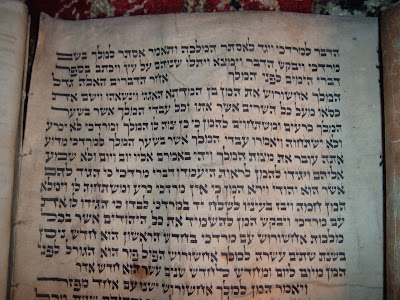




Purim: As practiced by Spanish and Portuguese Jews
Shabbat Zakhor is marked by the complete recitation of the poem by Rabbi Yehuda Halevi entitled Mi kamokha, which is
inserted immediately after the words Mi kamokha in the Shacharit service before Mazil ani mehazak mimenu in the middle of the Nishmat. They do not consider this as an interruption in the prayer (hefsek). The concluding stanza in each chapter of the Mi kamokha is first chanted by the entire congregation, and then these four lines are repeated by the hazzan. The Sabbath of Parashat Zakhor is thus also referred to by the Spanish and Portuguese Jews as Shabbat Mi kamokha.
inserted immediately after the words Mi kamokha in the Shacharit service before Mazil ani mehazak mimenu in the middle of the Nishmat. They do not consider this as an interruption in the prayer (hefsek). The concluding stanza in each chapter of the Mi kamokha is first chanted by the entire congregation, and then these four lines are repeated by the hazzan. The Sabbath of Parashat Zakhor is thus also referred to by the Spanish and Portuguese Jews as Shabbat Mi kamokha.
The reading of the megillah is a special occasion enhanced by the richly decorated cases in which the megillot are contained. Some of the megillah parchments are illuminated with decorative motifs or pictures illustrating the story of Esther. During the Megillah reading in Shearith Israel (which has long excluded from its services any disturbing or disrupting features, even on that evening), the reading of Purim story proceeds uninterrupted amidst a quietly relaxed, happily smiling congregation. The few who do knock with their feet at the mention of Haman's name are discouraged from doing so. This is in keeping with the overall spirit of decorous worship in the sanctuary at all times.
The hazzan who reads the Megillah is flanked by seganim on either side of him who help with the folding of the Megillah in the form of an iggeret (letter), as is traditional.
After the entire Megillah has been read, the hazzan repeats Layehudim hayeta ora vesimeha vesason vikar (Esther 8:16), the congregation repeats it after him, and then the Megillah is rolled up.
Following the reading of Megillah, the hazzan recites the berakha,Harab et ribenu and continues with arur Haman, to which the congregation responds, Barukh Mordekhay. He then says, Arura Zeresh , to which they respond, Barukha Esther. He continues with Arurim Hareshaim, to which the congregation replies, Berukhim Kol Yisrael. Then the Hazzan concludes with Vegan Harbona, to which the congregation responds, Zakhur letob.
The Sheheheyanu is recited only in the evening reading of the Megillah and not the following morning.
It was the tradition to provide money for the poor on Purim and to make a contribution to everyone who put out his hand on that day seeking aid. In addition, the traditional Mishloah manot are given to family and friends.
The Spanish and Portuguese tradition is devoid of the high- spirited fun and frolic which takes place among the other communities on this day. This is in keeping with the time-honored tradition of sedate observance for which Holland and the Spanish and Portuguese Jews have long been known.
An interesting difference between the American Spanish and Portuguese tradition and that of Holland is that here the Megillah is read in the morning, while the Sefer Torah remains on the teba. In Holland, the Sefer Torah is first returned to the ark, and only then is the Megillah read.
If Purim should fall on Saturday night, the Spanish and Portuguese tradition is to read the Megillah first and then recite Habdalah.
This differs from the tradition of other Sephardim, who follow the teaching of the Aburdarham in this matter.
When Purim starts on Saturday night, the service begins with LeDavid barukh and Lamenazzeah (Psalms 144 and 67), followed by Psalm 22, Lamenazzeah al ayelet hashahar mizmor leDavid.
The Spanish and Portuguese tradition follows that of all other Sephardim in repeating the last verse of Vayabo Amalek in the Torah reading in order to complete ten verses of the Torah, which is the minimum which one should be permitted to read from the Torah.
The mahazit hashekel is given on Purim in the evening or during the day by placing the money into the small boxes attached to the teba. There is no tradition of taking three coins and lifting them (to make a kinyan) for the mahazit hashekel, but they simply put money into the little boxes for charity.
Leilui Nishmat Clotilde Nicolau Pereira A"H
Leilui Nishmat Jose Simplicio da Silva A"H

No comments:
Post a Comment